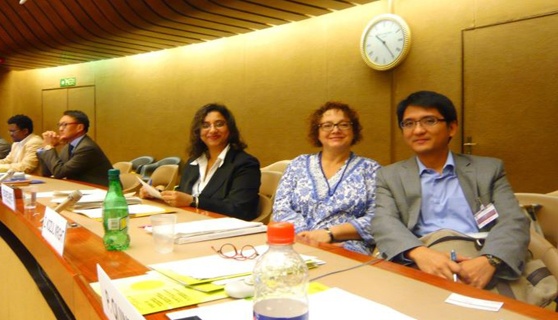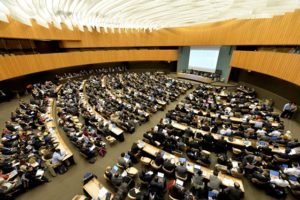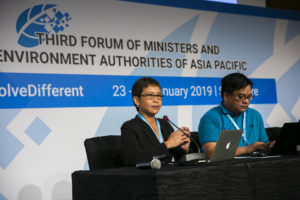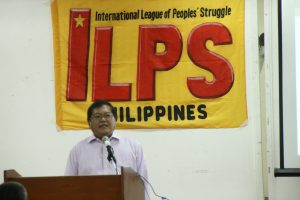5 October 2011
UN Social Forum
Geneva, Switzerland
[[{“type”:”media”,”view_mode”:”media_large”,”fid”:”120″,”attributes”:{“alt”:””,”class”:”media-image”,”height”:”233″,”style”:”width: 310px; height: 233px; margin: 10px; float: right;”,”typeof”:”foaf:Image”,”width”:”310″}}]]
This year marks the 25th anniversary of the United Nations Declaration on the Right to Development. Adopted by General Assembly resolution 41/128 of 4 December 1986, this Declaration defines such right as "an inalienable human right by virtue of which every human person and all peoples are entitled to participate in, contribute to, and enjoy economic, social, cultural and political development, in which all human rights and fundamental freedoms can be fully realized." (Article 1)
At the time of its adoption, many saw in this Declaration an outstanding political instrument and considered it a milestone in a decade and a half of struggles by developing countries for a New International Economic Order (NIEO).
It’s a fairly comprehensive articulation of economic, social and cultural rights as well as political rights. It recognizes the collective rights of peoples, not just individual rights of persons. While the human person is identified as the ultimate beneficiary (right-holder), the RTD can nevertheless be invoked both by individuals and by peoples. And most significantly, it clearly recognizes the collective obligation of all states to create a just and equitable international environment for the realisation of the right to development.
The RTD thus imposes obligations both on individual states – to ensure equal and adequate access to essential resources – and on the international community – to promote fair development policies and effective international cooperation.
From a civil society perspective, one can conceive of a comprehensive and multi-faceted development advocacy campaign around the concept of the RTD. Even today a wide range of peoples' issues can be linked to this overarching theme — poverty-eradication, food sovereignty, ecological/climate justice, national sovereignty, and so on. Such a campaign can be advanced at the national level and the international level.
It can target national governments, regional bodies and international institutions including the International Monetary Fund (IMF), the World Bank and the World Trade Organization (WTO); transnational corporations (TNCs) and other transnational actors – to hold them to account as duty-bearers. It has the potential of providing a unifying platform for disparate international campaigns on aid, debt, trade, finance, and other issues related to development. And it has broad appeal and large mobilizing potential even among decision-makers because it builds upon a universally accepted covenant and an ongoing official political process.
And yet 25 years since the adoption of the Declaration of the RTD these potentials remain unrealized.
In many ways, this is the same fate that has befallen another outstanding political declaration whose 20th anniversary shall be commemorated next year – the Rio Declaration on Environment and Development. This declaration affirmed the RTD but also builds on it.
Principle 3 of the Rio declaration states that, “The right to development must be fulfilled so as to equitably meet developmental and environmental needs of present and future generations.”
It identifies the three integral and mutually reinforcing pillars of sustainable development as economic prosperity, social equity, and environmental protection. It recognized the need for international cooperation to support national action for sustainable development.
But it makes the crucial contribution of explicitly framing this in terms of the common but differentiated responsibility principle whereby “The developed countries acknowledge the responsibility that they bear in the international pursuit of sustainable development in view of the pressures their societies place on the global environment and of the technologies and financial resources they command."
In effect, the Rio declaration establishes the link between the past economic exploitation of global commons and the responsibility to carry out actions that remedy or mitigate the consequences of such exploitation.
Today the world finds itself far off track in realizing the vision of the RTD and Rio. Global economic expansion continues to severely strain the environment. Humanity’s ecological footprint now exceeds the planet’s biocapacity by over 50%, and three of nine planetary boundaries that define the safe operating space for human life on Earth have been breached.
And the costs and benefits generated by that economic expansion are shared very unequally. In 1990, the ratio of the per capita income in the richest 20 countries to that in the poorest 20 was $42 to one dollar; in 2005, it was $59 to one dollar. One out of three persons today or about 1.75 billion people live in acute deprivation in terms of health, education and material standard of living. There are 80 million more people living in income poverty in 2005 compared to 1981 if the handful of BRICs are excluded. And close to a billion people do not even have the very basic condition for human existence, that is adequate food.
So what happened to 25 years of the RTD and 20 years of Rio?
It is also well worth remembering that 30 years ago Ronald Reagan came to power in the US, and Thatcher 2 years before him in the UK. Together they unleashed the neoliberal offensive globally which systematically eroded the role of the state in the market, pulled back the public provisioning of goods and services, dismantled hardwon social entitlements, constricted the policy space for independent development, unleashed vicious attacks against the labor movement and other movements of resistance at home and especially abroad, propped up dictators, instigated wars and low-intensity conflict, and essentially undermined the enabling conditions for the progressive realization of people’s rights the world over.
In terms of institutionalization, the RtD has nothing firm to stand on. It has elaborated criteria and sub-criteria to serve as reference for policy makers. There are reporting procedures for substantive rights that constitute the RTD and the Human Rights Council can exercise moral suasion over violators. But nothing much more compelling than these.
The Rio Declaration at least has the benefit of legally binding treaties – the UN Framework Convention on Climate Change, the Convention on Biodiversity and Convention on Desertification. But still no real enforcement mechanism and not much by way of financial backing.
Neoliberalism however has real teeth. It has financial backing from international financial institutions as well as donor countries. It has legally binding treaties and a multilateral organization – the WTO — with a dispute settlement system based on retaliation and sanctions. It has investment tribunals where TNCs can sue governments.
So in the face of state-backed corporate power, or corporate-led state power, how can advocates promote the RTD and the Rio principles today?
The best way is to re-affirm these principles is by promoting a rights-based approach to sustainable development in response to the grave economic, social and environmental crises confronting the world today. To put it bluntly, there is no real development possible unless it transcends the present economic and social system that engender these crises.
The 2012 UN Conference on Sustainable Development or Rio+20 offers an excellent political opportunity to do this. One of the major themes of the upcoming Rio+20 Conference is the “green economy”. Many civil society organizations fear that the green economy agenda will consist primarily of market-based, private-sector led initiatives or technological fixes that may inadvertently reinforce corporate control over natural resources and environmental services at the expense of the people who are most dependent on these resources.
There is also the fear that market-based schemes such as carbon trading and offsets allow cop-outs for large polluters and therefore continue to lock-in the same unsustainable patterns of production and consumption.
By framing sustainable development in terms of indivisible rights of individuals and peoples, the RTD obliges states to resort to the entire array of regulatory instruments and mechanisms that would be necessary to effect a rapid transition to sustainable development pathways. It also underscores the democratic right of people to determine the goals and means of achieving sustainable development. Along this line, there are proposals for the development of regional conventions on Principle 10 of Rio which is about ensuring access to information and meaningful participation of people in sustainable development.
The second major agenda of Rio+20 is the IFSD. This is about ensuring greater coherence and effectivity in the governance of all three pillars of SD – economic, social and environmental. There are numerous proposals on the table ranging from merely strengthening the UNEP, to elevating the Commission on Sustainable Development to become the Council on Sustainable Development, to the creation of a World Environment Organization.
Regardless of which set-up is chosen, the RTD can provide a normative framework for policy coherence inasmuch as it expresses all three pillars in terms of peoples rights and underscores the duties of the international community to protect, respect and fulfill those rights. Again, following the principle of democratic participation, such a IFSD must ensure the participation of civil society as development actors in their own right through multi-stakeholder mechanisms.
In particular, there is a proposal for a convention on the conduct of international sustainability impact assessments requiring multistakeholder assessments of the human rights and sustainability implications of certain projects programs, policies, new legislations or new treaties; a framework convention on corporate social and environmental sustainability. There are calls for the establishment of an International Environmental Court to deal with environmental disputes and the establishment of Ombudspersons for Future Generations at the global, national and local levels who will functon as sustainability auditor and handle citizens complaints.
All these would be additional means of seeking social and environmental justice, holding national and international actors to account, and also add new instruments for strengthening the justiciability of the RTD.
The Rio+20 conference will also be tackling new and emerging issues such as the energy, food and water security. Again these are major issues faced by countries and impoverished and marginalized communities across the globe. Showing the relevance of the RTD to these concerns would further raise the utility of the RTD for social mobilization and civil society advocacy.
For all these to happen, the UN agencies need to engage in more aggressive policy advocacy themselves. The UN needs to be seen more often in other halls of power – in Washington, in Brussels, in Paris, even in Beijing, Delhi, Brasilia, and so on.
The gravity of the multiple crises confronting the world today — not the least of which is the climate crisis which is an existential crisis — is forcing people to re-examine fundamentals. People’s values and lifestyles, their conceptions of the good life, social relations as well as the relationship of man with nature – all these are being reconsidered and reimagined. This will inevitably influence the direction of development discourse and practice, or else, as the people in the Arab Spring have demonstrated, and likewise working people in Greece and Spain, in the US, Chile, Bolivia, and so on, people will claim their rights despite the wishes of those in power.
_____________________________________________________________________________________
Notes:
- Celestine Nyamu-Musembi and Andrea Cornwall. What is the “rights-based approach” all about? Perspectives from international development agencies. IDS Working Paper 234. November 2004. Institute of Development Studies. Sussex, UK.
- Rockstrom, Johan et al, “A safe operating space for humanity,” Nature 461: 472-?475 (2009).
- International Monetary Fund, World Economic Outlook Database, http://www.imf.org/external/pubs/ft/weo/2010/01/weodata/index.aspx; accessed 30 May 2010. Simple average of the per capita GDP (PPP) of the top and bottom 20 countries ranked by per capita GDP (PPP) in the years 1990 and 2005. Data not available for some countries in 1990.
- UN Development Programme, Human Development Report 2010 —20th Anniversary Edition. The Real Wealth of Nations: Pathways to Human Development. (New York: United Nations, 2010).
- UN Department of Economic and Social Affairs, Report on the World Social Situation 2010: Rethinking Poverty (New York: United Nations, 2009)




